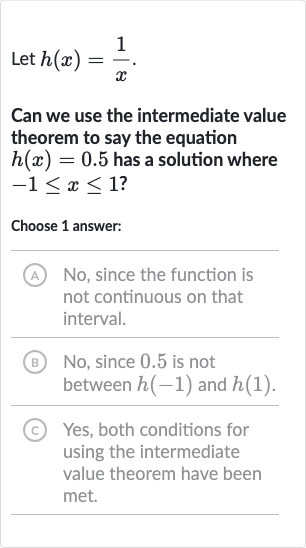AI tutor
Welcome to Bytelearn!
Let’s check out your problem:

Let .Can we use the intermediate value theorem to say the equation has a solution where ?Choose answer:(A) No, since the function is not continuous on that interval.(B) No, since . is not between and .(C) Yes, both conditions for using the intermediate value theorem have been met.
Full solution
Q. Let .Can we use the intermediate value theorem to say the equation has a solution where ?Choose answer:(A) No, since the function is not continuous on that interval.(B) No, since . is not between and .(C) Yes, both conditions for using the intermediate value theorem have been met.
- Theorem Statement: The intermediate value theorem states that if a function is continuous on a closed interval and is any number between and , then there exists at least one number in the interval such that .
- Check Continuity: First, we need to check if the function is continuous on the interval . We know that is not defined at , which lies within the interval . Therefore, is not continuous on the entire interval because of the discontinuity at .
- Use of Theorem: Since is not continuous on the interval , we cannot use the intermediate value theorem to say that the equation has a solution on that interval.
